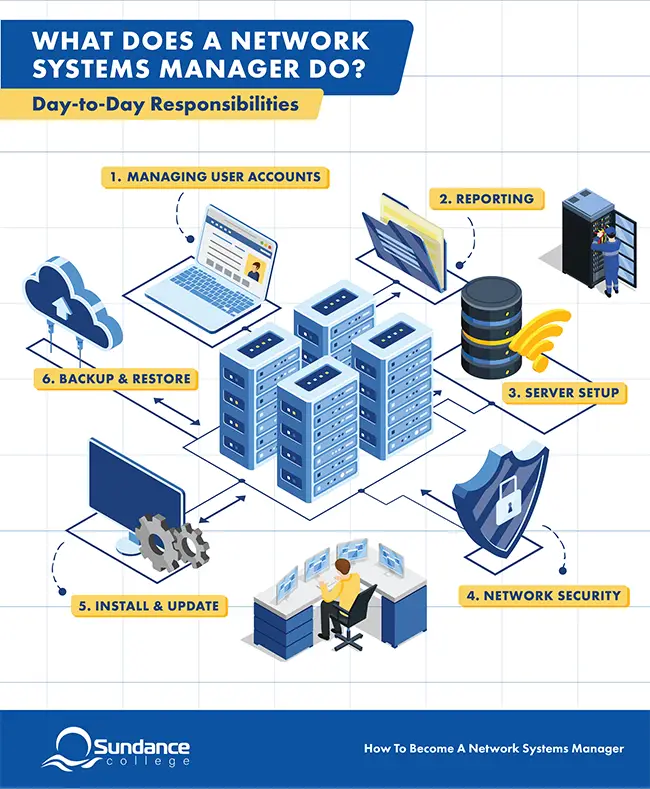Blog / Ready for Tech Success? Here’s How To Become a Network Systems Manager
Ready for Tech Success? Here’s How To Become a Network Systems Manager

Network Systems Manager Diploma
- Network Administrator
- Network Systems Administrator
- IT Support Technician
- Network Support Technician
Table of Contents
Are you intrigued by the world of technology? Fascinated by the intricacies of networks and motivated to work in the digital domain? Then look no further! A career as a network systems manager is the perfect fit for you. Whether you’re a tech enthusiast looking for a career change or you’re already experienced in the world of IT, this guide will provide the insights you need to take your next step.
This field combines the best of both worlds – the ever-changing landscape of technology and the strategic thinking needed to drive success. With the right skills, knowledge, and training, you can access exciting opportunities and make an impact on the tech industry.
In this guide, we will explore what it takes to become a network systems manager, from the roles and responsibilities to the skills needed, we’ll show you how a diploma in Network Systems Management is your gateway to success in this modern and dynamic field.
What Does a Network Systems Manager Do?

In today’s fast-changing tech world, Network System Managers are essential for ensuring a company’s computer network runs smoothly. These professionals, who may serve as network administrators, IT managers, network analysts, or Cisco Networking Specialists, play a crucial role in maintaining technological and network fluidity in any workplace.
Their responsibilities involve a wide range of tasks, from evaluating network performance to troubleshooting issues and implementing security measures. They also need to stay up to date with the latest technological advancements that could make their department more efficient and effective.
On a day-to-day basis, a network systems manager could be:
- Setting up and maintaining servers, routers, switches, firewalls, and other network devices
- Installing and updating network software and applications
- Creating and managing user accounts, passwords, and permissions
- Implementing and enforcing network security policies and procedures
- Backing up and restoring data and files
- Documenting and reporting network issues and solutions
As someone in a managerial role, planning and managing budgets, projects and schedules, training and supporting their team members and other staff, and developing new policies to help the team and the system to run smoothly, may also be part of this role(s).
The role of a network systems manager is versatile and is needed in every organization. This means that qualified and skilled individuals can work in various anywhere from offices to schools, hospitals, government agencies, or IT companies.
As an essential technical worker, a network systems manager can also specialize in different areas of network administration, such as cloud computing, wireless networking, or cybersecurity, and grow their skills in their chosen area.
What Skills Do You Need to Become a Network Systems Manager?

To become a successful network manager, you need to have technical skills, hard skills, and soft skills. As the manager of an organization’s infrastructure, you must possess a diverse skillset to navigate the technology while also leading your team.
A diploma in network systems management can set you up with the technical knowledge you’ll need to succeed in this career. The program curriculum includes courses such as:
- IT Fundamentals
- Network+
- Security+
- Microsoft Azure Security Technologies
- Microsoft Azure Architect
These courses, along with the rest of the program, will give you what you need to jump straight into your new role and grow in your new career. During the program, you will also pick up technical skills like routing and switching, firewall management, and server administration to help you on your way.
Network Systems Managers’ Hard Skills
As well as knowledge and technical ability, you will need to have a set of hard skills to become a network systems manager, such as:
- Knowledge of network protocols, standards, and architectures
- Proficiency in network operating systems, such as Windows Server or Linux
- Ability to install, configure, troubleshoot, and maintain network hardware and software
- Familiarity with cybersecurity tools and techniques, especially those useful for organizations’ network security
- Experience with scripting languages, such as JavaScript
These hard skills are what employers look for when hiring a network systems manager and will help you to grow and develop your technical skills as your career progresses.
Soft Skills Needed Of Network Systems Managers
You may already possess some of the soft skills that you need as a network systems manager, as they are transferrable from one position to the next. Some of the key soft skills you will need to develop are:
- Communication skills: You need to be able to communicate clearly and professionally with users, clients, managers, and other IT staff. You also need to be able to write documentation and reports.
- Problem-solving skills: You need to be able to analyze complex network issues and find effective solutions. You also need to be able to think creatively and logically.
- Teamwork skills: You need to be able to collaborate, manage, and cooperate with other IT professionals on projects and tasks. You also need to be able to share your knowledge and expertise with others.
- Time management skills: You need to be able to prioritize your workload and meet deadlines. You also need to be able to multitask and handle stress.
Having a combination of technical, hard, and soft skills is the key to success as a network systems manager. They will not only prepare you for the challenges you may face in the role, but also position you as a leader capable of steering a digital infrastructure towards success.
Job Outlook and Demand for a Network Systems Manager in Canada

The training received in a Network Systems Manager diploma can lead to a number of different positions, as previously mentioned. As one example, the job outlook for a network systems administrator in Canada is positive, with provinces like Quebec, Alberta, and Nova Scotia boasting good job opportunities for this role in the next few years.
In Ontario, the job outlook for computerized information systems managers is also good. Overall, there is a balanced demand for these types of roles with certain areas experiencing higher demand.
The network systems manager role and similar roles are expected to be competitive, meaning your diploma certification and skills gained throughout your program will help you stand out as a candidate.
How to Succeed as a Network Systems Manager
Once you have completed your diploma program, you will be ready to enter the network systems management field.
While working as a network systems manager, the role will likely continue to change, and new growth opportunities will open as you follow your career path. Here are a few ways you can stay on track and progress your career:
- Stay Up to Date: The IT industry is constantly evolving and changing. New technologies, trends, and challenges emerge every day. You can attend workshops, read books and blogs, watch videos, listen to podcasts, etc. and learn future-proof career education that can set you up for success after your graduation and while you work.
- Network: Networking is not just for computers, it’s for people too! Professional networking (to distinguish the term from IT networking) is all about building relationships and connections with professionals in your field. Professional networking can help you learn from others, exchange ideas, share resources, find mentors, get referrals, and discover new opportunities. You can network with others by joining online communities, forums, groups, or platforms, such as LinkedIn, Reddit, etc. You can also attend in-person events, meetups, conferences, or webinars related to network security and network systems administration.
- Seek Feedback: Feedback is essential for improving your performance and skills. Feedback can help you identify your strengths and weaknesses, learn from your mistakes, and set goals for your improvement. You can seek feedback from your practicum supervisors, Sundance colleagues, IT clients, or end-users. But your first and best resource for feedback remains your instructor during your diploma program.
- Be Adaptable: As a network systems administrator, you need to be able to adapt to different situations and environments. You may have to work with different types of networks, systems, devices, software, or clients. You may also have to deal with unexpected problems or changes. You need to be flexible and open-minded to cope with these challenges and find solutions.
- Stay Curious: Curiosity is the fuel of innovation and creative problem-solving. Curiosity can help you discover new things, explore new possibilities, and find new ways of doing things. Curiosity can also make your job more fun and interesting. You can cultivate your curiosity by asking questions, trying new things, experimenting with different methods or cybersecurity tools, or challenging yourself with new projects.
How Can Sundance College Help You Launch Your Career as a Network Systems Manager?

Supporting Student Success
At Sundance College, we support student success from the moment you decide to enter a new career, to the day to start your new job.
Industry-Experienced Instructors
As an essential diploma program in the technology field, our Network Systems Manager diploma program is designed to prepare you for the real-world challenges and opportunities in the IT sector. Sundance graduate Huy appreciated the effort his instructors went to during his program:
“The instructors are nice, friendly; they are willing to help you to understand the lessons, even supported at the weekend. I would like to thank [them]. I truly appreciate [them] for helping me in many courses. I got a job after graduation. Now I have a bright future.”
Students learn from experienced instructors who have worked in the IT industry and have extensive knowledge of the latest networking management technologies and trends.
Industry Certifications Recognized World-Wide
Our diploma program will also help you prepare for industry certifications that are recognized and valued by employers. You will be well prepared to take exams for CompTIA A+, Network+, Security+, Cisco CCNA, Microsoft Azure Security Technologies, etc.
If tech students opt to take these exams, Sundance College will support their success by not only preparing them throughout their studies, but by helping with their exam fees.
Career Services And Practicum Placement
The Career Services team at Sundance College will assist you in finding employment opportunities after graduation. You will have access to resume writing workshops, interview coaching sessions, job fairs, employer visits, and other opportunities to help you find the job that is right for you.
Flexibility
The flexibility in the programs, study schedules, and the support from the instructors and Sundance College staff make it easy for those juggling other work or family commitments to return to education and further their careers. Sundance graduate Nicole benefited from the flexible study options:
“I have done two courses [through] Sundance and the experience has been amazing. The instructors were amazing and very supportive and understanding, some of us work full-time as well and have a family. Thank you for the great experience.”
The support of instructors and the Sundance team helped Nicole become job-ready and graduate from her program while balancing family life.
Career-Focused Education
The Network Systems Manager diploma program from Sundance College provides a career-focused and comprehensive education that allows you to bridge the gap between theory, skill development, and hands-on practice. The program is designed for you to become job-ready in less than a year!
The program not only accelerates your entry into the workforce but also equips you with the practical skills crucial for success. The positive job outlook in Canada reinforces the value of your chosen path. From foundational education to leadership roles, your journey to becoming a network systems manager is exciting and ready to begin.
Join us at Sundance College to begin your educational journey. Take your first step towards your future today and chat with one of our admissions advisors to learn more about the Network Systems Manager diploma program.
Related Blogs
Subscribe for more career advice
Blog Categories
Share on:
